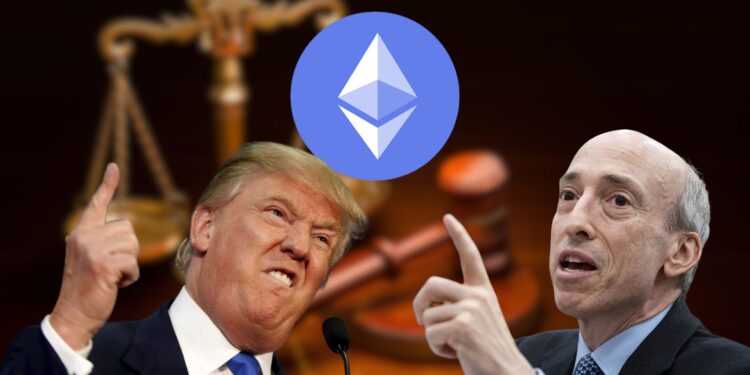- Donald Trump’s potential appointment of a crypto-friendly SEC chair could enable spot ETH ETFs to offer staking rewards, boosting Ether’s price prospects.
- Staking could be a game-changer for spot Ether ETFs, as it would provide a competitive advantage over spot Bitcoin ETFs by offering passive income to investors.
- While a new SEC chair may take a more relaxed approach to staking, they cannot unilaterally change regulations, as the commissioners and courts also play a role.
The Securities and Exchange Commission (SEC) under current chair Gary Gensler has taken a restrictive stance on crypto, blocking key innovations like Ethereum staking. However, the election of Donald Trump as US President is expected to lead to the appointment of a new, crypto-friendly SEC chair. This shift in leadership could enable Ethereum Exchange Traded Funds (ETFs) to offer staking rewards and boost Ether’s price.
Why There Are High Hopes for a New SEC Chair
President-elect Donald Trump has promised to support crypto and plans to replace SEC chair Gary Gensler. While the President can’t directly fire the SEC chair, he can demote Gensler and appoint a new chair from the existing SEC commissioners. Gensler may also choose to resign following the change in administration.
Trump aims to appoint a crypto-friendly SEC chair. The crypto community hopes this will lead the SEC to take a more open stance on innovations like Ethereum staking that are currently blocked under Gensler’s restrictive policies.
How Staking Could Boost Struggling Ether ETFs
Ether price and Ethereum ETFs have underperformed expectations. One factor is that Ethereum ETFs can’t currently offer staking rewards.
Bitcoin ETFs saw huge inflows after launching, with over $25 billion assets under management (AUM). But Ethereum ETFs only reached $8 billion AUM despite strong initial demand.
Allowing staking could make Ethereum ETFs more appealing. Even a 1% staking yield could offset ETF management fees and attract inflows from yield-seeking investors.
Ethereum also suffers from lower brand awareness than Bitcoin among institutions. Allowing staking would give Ethereum ETFs a clear differentiator to stand out versus Bitcoin.

Remaining Hurdles for Enabling Ethereum Staking
A new SEC chair can’t unilaterally change the regulatory stance on staking. Ongoing SEC enforcement actions can’t simply be canceled, and staking could still face challenges in court.
The SEC currently views staking as a security. Overcoming this requires convincing a majority of commissioners, not just the chair. Other agencies like the Department of Justice could also pursue cases regardless of the SEC’s position.
Conclusion
Appointing a crypto-friendly SEC chair would be a hugely positive step for Ethereum by raising the likelihood of allowing staking on ETFs. But securities law challenges mean there are still potential roadblocks ahead.














